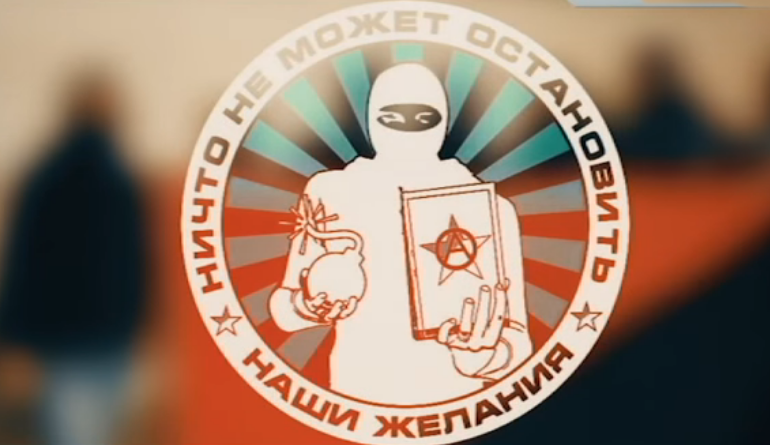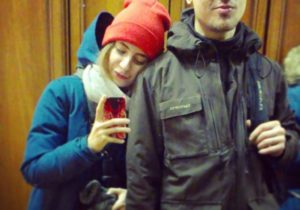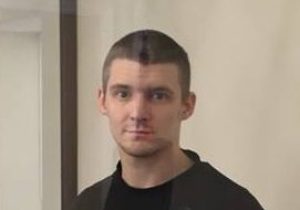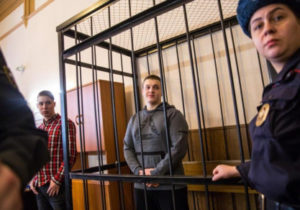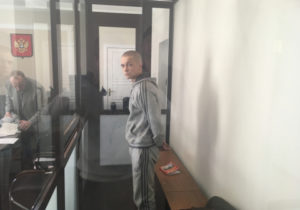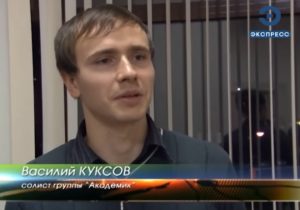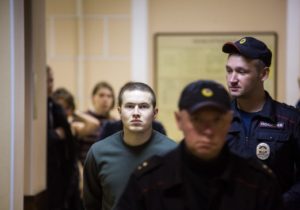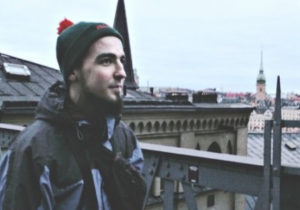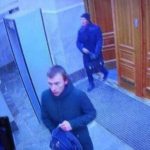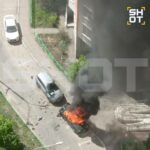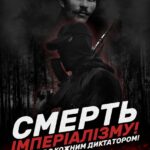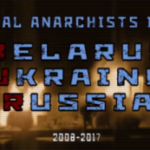Anarchia Today
The arrests of anarchists
Autumn of 2017. The Russian state actively participates in the Syrian war. International relations are destroyed by the annexation of the Crimea, military interventions and threats. Society remembers the murder of the prominent opposition politician Nemtsov. Hundreds of political immigrants and dozens of political prisoners. Trade sanctions and falling energy prices are devastating the economy. Mass protests against corruption and the general strike of cargo carriers, the guerrilla war of Islamists in the South – such is the reality of Russia. In just a few months, presidential elections will be held.
In October, vague rumors spread that a number of anarchists were arrested in Penza. But in the websites there is nothing. It is hard to get any of information. Even the number of detainees is unknown. Only some fragments of leaks are reporting that the anti-terrorist department of the FSB (secret service) is involved in the arrests. This is hard to believe, because in Penza for several years there have been no any radical actions. It seems that the rumors are unreliable, exaggerated.
Suddenly, inside the anarchist circles appeared news from one of the arrested. He asks everyone he knows to flee and reports that “the FSB has methods, which are efficient.” Those comrades who assumed the worst disappeared in advance.
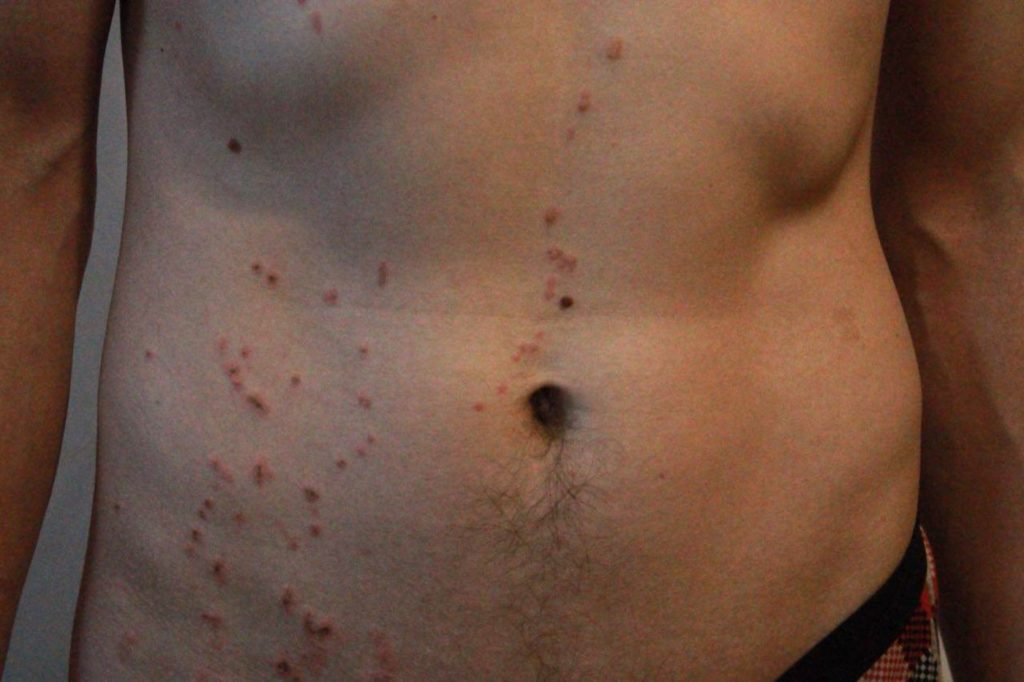 For three months the case was covered with a fog of obscurity until a new wave of arrests began. In St. Petersburg, Victor Filinkov, Igor Shishkin and Julian Boyarshinov were detained. Also Ilya Kapustin, a work mate of one of the arrested, was detained too. After the interrogation, he was released. He told about the tortures and left to Finland, where he requested political asylum. At that moment the case became widely publicized and details appeared, concerning tortures as well.
For three months the case was covered with a fog of obscurity until a new wave of arrests began. In St. Petersburg, Victor Filinkov, Igor Shishkin and Julian Boyarshinov were detained. Also Ilya Kapustin, a work mate of one of the arrested, was detained too. After the interrogation, he was released. He told about the tortures and left to Finland, where he requested political asylum. At that moment the case became widely publicized and details appeared, concerning tortures as well.
Political asylum in Finland was also requested by Aksenova Alexandra, Filinkov’s wife. The investigation considers her an ideologist of the “Network”, and gaining military training in Ukraine.
Underground
According to the FSB, the arrested belong to the underground anarchist organization “Network”, which consists of several autonomous groups. The aims of the Network are the rocking of the people during mass protests, attacks on the authorities during the presidential elections and the World Cup, the physical destruction of the heads of local administrations, leaders of “United Russia” party and the chiefs of subdivisions of the internal affairs agencies, and the overthrow of the constitutional order.
It is only known for certain, that the anarchists conducted military training in the forest. Participants learned the battle tactics, pyrotechnics, survival techniques, first aid. The video recording of such training is at the disposal of the FSB. Nevertheless, there is no evidence of a radical acts, and detainees are not even accused of committing such acts.
Chronology of arrests
In October-November 2017 in Penza members of the local group of “Network” were arrested:
Egor Zorin
Ilya Shakursky
Vasily Kuksov
Dmitry Pchelintsev
Andrey Chernov
Arman Sagynbaev
Age – from 21 to 27 years.
Two more participants of the Penza group “5.11”, according to materials of the investigation, fled. During the search of apartments and cars, operatives of FSB seized pistols, grenades, gunpowder, and materials for explosive devices. Arrests took place not simultaneously, but were held during two weeks. However, not many people took the opportunity to escape.
According to the same investigation materials, Filinkov and Shishkin, detained at the end of January 2018, were members of the St. Petersburg groups, the “Field of Mars” and the “Jordan”, respectively. To what group was attributed Boyarshinov is still unknown. In addition to arrested, FSB suppose membership in Petersburg branches of at least for 8 more people. Also, two more are mentioned in relation to the Moscow group “MSK”. Also, the FSB announced the existence of a “Network” branch in Belarus. Later, the KGB detained a Belarusian anarchist, but it is for unknown whether this is connected with the “Network case”.
Testimony
The main evidence are the testimony of the detainees. Unfortunately, among of 9 people, only Vasily Kuksov and Julian Boyishin refused to speak. All the others gave testimony about themselves and comrades.
“A masked man came in, he had a handkerchief in his hand covered in blood, that’s when I heard the name of Kuksov. It was then that I realized whose moans came from the next room”(Shakursky)
Operatives of the FSB immediately, along with classical beatings, began to use torture by electric shock. Usually, operatives used electric shockers, but in some cases they used electrodes.
“They blindfolded me and stuffed my mouth with a sock. But then to my thumbs on my feet some sort of wiring was attached I felt the first charge of the current, from which I could not restrain moaning and trembling. They repeated this procedure until I promised to say what they would tell me. Since then, I forgot the word “no” and said everything that the operatives told me. ” (Shakursky)
Electric shocks were applied dozens of times, throughout the body, including genital area.
“He alternated impacts in the leg with electric shocks in handcuffs. Sometimes beat in the back or neck … I gave up almost immediately, in the first ten minutes. I shouted: “Tell me what to say, I’ll tell you everything!” – but the violence did not stop. “(Filinkov)
It is important to note that the operatives used torture even after the arrested were visited by Public Supervisory Commission (PMC). During the visit to Filinkov, human rights watchers found fresh traces of beatings, bruises, traces of burns from electrocution. But it didn’t stop tortures.
The operatives forced them to learn “the testimony” they wanted, the wrong answers led to new impacts. They distributed the roles themselves and selected the facts arbitrarily, rewriting them many times.
“I was asked questions, if I did not know the answer – I was hit, if the answer did not coincide with their [expectations] – I was hit, if I thought about or formulated [for a long time] – I was hit, if I forgot what they said – I was hit. “(Filinkov)
“The investigator few more times took sheets with my “testimony” out from the room. It became clear that this whole story, sponsored by FSB officers, has editors-in-chief who are watching that nothing comes out of the general canvas. ”
Not only the accused but also the witnesses were tortured. The operatives seized Ilya Kapustin a work mate of Shishkin.
“I want to bring the deepest apologies to the people whom my problem touched, sorry, guys!” (Shishkin)
“When I didn’t know the answers to some questions, for example, when I did not understand who or what I was talking about, they beat me with an electric shock to the groin area or to the side of my stomach. I was hit with an electric current to make me say that this or that friend of mine is going to arrange something dangerous.” (Kapustin)
Pchelintsev Dmitry was hung upside down with a dynamo attached to his fingers. He was brought to such an extent that “they touched my neck and checked that I did not die from …”. Later Dmitry announced the torture with a lawyer. Then he was tortured again, and got warning that if he again “turns back”, then repressors will imitate his suicide and show a video recording to relatives.
Andrei Chernov, in addition to torture, was also threatened with the fact that his brother would be imprisoned too.
Boyarshin was beaten after being detained for refusing to speak. Later, he was transferred to the detention center “Gorelovo”, where he was beaten straight in the cell by prison activists of the administration. This prison is notorious for its outrage, at the behest of the authorities, prisoners are beaten, raped, tortured. The torture process is controlled by FSB operatives. They come and demand that Julian testify, but for now he keeps strong.
Solidarity under the ban
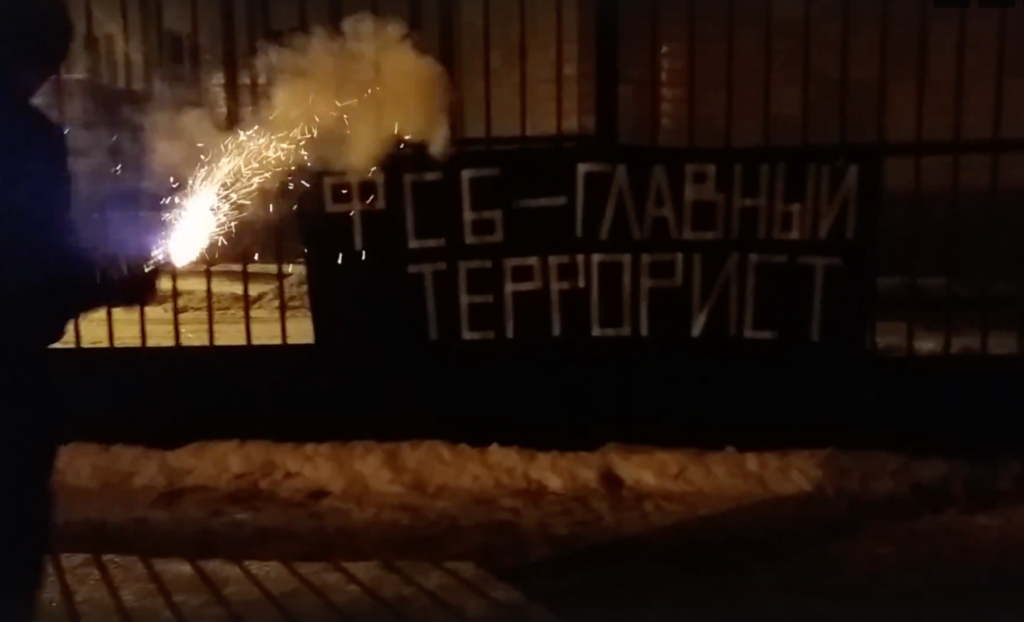 The FSB did not stop at the figurants of the “Network case”. Unexpectedly, they began to stop criticism and solidarity with the arrested. The first strike was taken by human rights activists who made critical statements. Dinar Idrisov, who said that before the presidential elections, there is a planned sweep of people who were in the base of the Center “Extremism” (another security agency), was beaten at the entrance of his house. Other journalists who covered solidarity actions were searched.
The FSB did not stop at the figurants of the “Network case”. Unexpectedly, they began to stop criticism and solidarity with the arrested. The first strike was taken by human rights activists who made critical statements. Dinar Idrisov, who said that before the presidential elections, there is a planned sweep of people who were in the base of the Center “Extremism” (another security agency), was beaten at the entrance of his house. Other journalists who covered solidarity actions were searched.
The FSB had a conversation with the anarchist Sofiko Arifjanova, they wanted her to testify that the anarchists allegedly support the “Pre-bombardment” movement of the nationalist Maltsev, whose supporters were massively detained in November 2017. Shortly before the arrests, Maltsev suddenly declared himself an anarchist, which can hardly be an coincidence.
In January 2018, Moscow anarchists held street actions of solidarity, including braking a window of the office of the “United Russia” party and throwing a fireworks pyrotechnic inside. A few days later, the special forces broke into the apartments of Elena Gorban and Alexei Kobaidze, they were searched and taken to the police station for interrogation.
In February 2018, an action of solidarity was held in Chelyabinsk, in front of the FSB department was posted a banner with the slogan “FSB – the main terrorist.” A few days later, spetsnaz detained the anarchist Dmitry Tsibukovsky directly at the factory where he worked. Also, three more people were detained. Tsibukovsky and Maxim Anfalov were beaten and tortured with electric shocks. They were forced to plead guilty for the action and to give evidence.
“They beat with a shocker on the waist, on the legs, on the hands – it felt like they put something very hot. The most unpleasant thing was when they hit in the handcuffs, it was very painful, and because I jerked, it hurt even from compression of the handcuffs. The most painful hits were on hands – they told me to hold on the shocker with both hands and hit it. It was very painful. “(Anfalov)
“As I did not confess for a long time, the operative applied an electric shock to me. He inflicted at least five strokes on my leg to the thigh area. After each stroke, he asked if I had decided on what to say. The pain from the current was unbearable, and I decided to “confess,” to give testimony that the operatives needed, to stipulate myself and others. For me at that moment it was important to get out alive from this situation. During the interview, the operative wrote the testimony himself and gave it to me to sign. ” (Tsibukovsky)
Safonova Anastasia was not tortured, but she was forced to listen to the torture of Tsibukovsky, her boyfriend.
“During the interview, I was given the opportunity to speak with Safonova on the internal phone with the neighboring office in which Safonova was held. I was told that we must convince her to confirm my words and then they would let us go together.” (Tsibukovsky)
Over Dmitry Semenovy operatives scoffed forcing him to stay in a half-squat position for a long time.
“They brought some sort of apparatus, they said it was some kind of electric shocker, they tied me to a chair and told me that I had the last chance to write a confession, but I still did not write it” (Semenov)
From torture he was rescued by a lawyer, who came quickly.
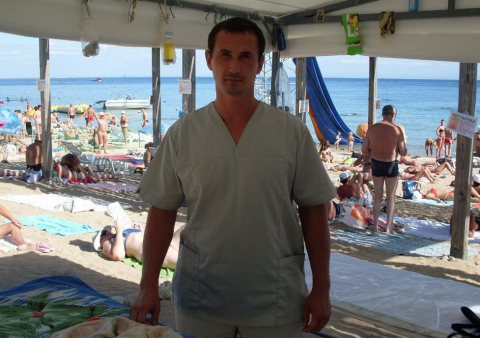 In February, anarchist Yevgeny Karakashev was detained by police officers in Yevpatoriya (Crimea). He was charged with inciting hatred and public calls for terrorism. The basis was a video of “Primorye Partisans”, a combat group of Rissuan Far East, which operated until 2010.
In February, anarchist Yevgeny Karakashev was detained by police officers in Yevpatoriya (Crimea). He was charged with inciting hatred and public calls for terrorism. The basis was a video of “Primorye Partisans”, a combat group of Rissuan Far East, which operated until 2010.
In early March, in Sevastopol (Crimea), members of repressive structures broke into the house of anarchist Alexei Shestakovych with a search. They put a cellophane bag on his head and took him to the bus, where he was knocked to the floor.
“The shoes flew off – they had removed the shoelaces in advance. They closed the bag on my head, the air ran out, and I began to suffocate. I try to breathe, they tighten even more. Ten or twenty minutes passed. At this time, they raised my arms from behind by the handcuffs, wringing them out. They say to me: “Shout ” I’m an animal!”. I shout – they let go. The thumb of the hand was taken and slowly turned out. He’s knocked out now. When it got really bad, he asked: Does not it rock you there?? “(Shestakovych)
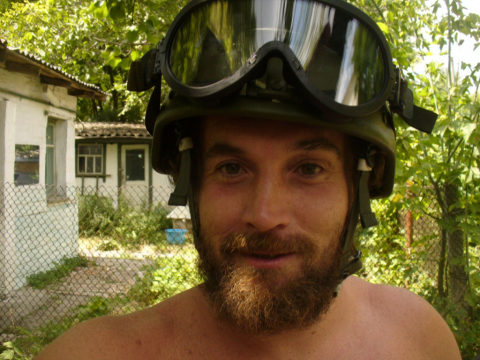 Shestakovich was sentenced to 11 days of arrest for publishing banned songs on the social network. After serving his term, Ilya moved to Ukraine.
Shestakovich was sentenced to 11 days of arrest for publishing banned songs on the social network. After serving his term, Ilya moved to Ukraine.
In March, seven people were detained in Moscow, anarchist Svyatoslav Rechkalov and his flat mate, as well as several leftists, who were later released.
“My neighbor ‘s and my hands were tied up by the ties behind our backs, blindfolded us with black tape and placed in the trunk of a micro van. They tell me that it is wrong to act as criminals in the fight against crime. It is necessary to cooperate with the authorities and engage in socially useful activities. One said with a sneer: “Well, I think that such a motivated revolutionary for the sake of his idea will stand any pain. Two or three people started beating me. The hits were not strong, but the power of the electrical current discharges increased, which became quite painful. Someone from behind grabbed me by the pants, they began to yank and shout that they will now go to the eggs. After that I said that I was ready to talk [he testified against himself, but not against the others] “(Rechkalov)
Coverage of the case in Russia
A number of Russian anarchists and journalists interpret this story in their own way. Arrested anarchists are called by amorphous terms “anti-fascists” or “left activists”, and completely deny the existence of an anarchist underground, giving it away for the FSB’s fantasies. What is the purpose of this?
First of all, the desire to influence the opposition-minded civil society, so the story can receive maximum resonance and sympathy, and raise the necessary money for lawyers. Obviously, the goal has been achieved, repressions are widely covered, human rights activists have joined the company of solidarity.
Of course, that in court some of the arrested will deny the blame, and some activists assumes that public opinion will help to achieve a mild sentence … The parents of comrades want to believe this, they can not accept the inevitable yet.
But is it really possible to believe in this? Maybe public opinion prevented the conviction of Pussy Riot? Did it protect sentenced protesters of 2012? Did it help Dmitry Buchenkov to avoid obviously fake accusation? The society will forget about the prisoners in 1-2 years, and the only thing they will have are few close persons and their own credo that will not allow them to slip into the abyss of years of despair. Counting on public opinion as a lever of pressure on russian deaf authority is a dangerous delusion.
It is impossible not to understand that our comrades will be imprisoned, demonstratively and cruelly. From the fact that some people want to help the detainees in the said way or want to convince themselves of the fiction of “Network”, objective reality will not change. And the mass of anarchists, and the FSB know that the anarchist underground is not a fiction.
So far, because of “self-restraint” anarchists lose their own identification. It creates the false impression that the FSB grabbed almost random leftists guys who only played airsoft games and shared foggy “antifascist” views. The word “anarchist” with regard to comrades occurs in mass media less and less, we are lost in faceless “anti-fascism”. Anarchists appear in the image of victims of state terror, who do not have anti-regime ambitions, their own political face. You have to pay the price of impersonality when you want to get the sympathy of the majority.
And, actually, the majority? With the toughening of the regime, the frustration of the population in liberals and legal ways of struggle is growing. Direct confrontation with the authorities will cause more and more sympathy. Russia has already passed this stage in the early 20th century, when revolutionaries provoked widespread sympathy of the society.
Anarchists should not be ashamed of themselves. We can, in principle, deny any “guilt” in court. However, an anarchist, denying accusations, can not give up his identity, his ideas. Nobody can condemn the very essence of the charges, in attacks on the authorities there is nothing shameful to be embarrassed and shunned. Authority would like it most of all, if for the sake of illusory chances in court the anarchists themselves expose radical methods. All that the detained comrades can do is to disrupt the FSB setting of repentance and self-denial, to pass the forthcoming trial with honor. This is what we all need to help.
International coverage of case
We do not know whether this was done consciously or not, but the international anarchist movement turned out to be misleading. For example, Crimethink reiterates the human rights version, force them to sign false confessions admitting to participating in an obviously invented terror network.»
On April 20th russian TV channel demonstrated propagate movie, including video from military training that does not resemble airsoft games at all.
Such kind of approach, like substituting reality with arbitrary interpretation (albeit with good intentions), destroys confidence within the movement. If you can not tell the truth — keep silence, but do not tell the lie.
The truth is that those arrested are anarchists, there is no any non-anarchist anti-fascist, or people who associate themselves as an anti-fascist on the first place. Also, the FSB is not grabbing any, but anarchists of a certain social-revolutionary direction.
However, does this mean that there is no falsification? Not at all.
Falsifications
Obviously, the FSB’s internal instructions have allowed operatives to use a certain set of tortures at their discretion, the main aim is to get the result. Previously, the publishing of the facts of torture, as a rule, stopped executors, they preferred not to take risks. Now publicity does not bother anyone, the operatives impertinently flaunt their unlimited power.
According to comrades, operatives are pushing very delusional versions, for example, about financing from Iran or links with the nationalist movement “Pre-bombardment”. Thus the operatives artificially overestimate the importance of the anarchists’ underground organization. With such methods of investigation nobody can reliably state where the truth is, and where the fiction. Such methods make it possible to create completely fake cases, as has been happening for a long time in relation to immigrants.
Such falsifications are reminiscent of the notorious practice of Stalin’s courts. In the 30th, the violence against arrested people grew from year to year, and reached the level of sophisticated medieval tortures. European anti-fascists, who had been interrogated by the Gestapo, and later were arrested by the NKGB [proto-KGB] in the USSR, asserted the obvious borrowing of the arsenal of torture from the Nazis. At the same time, there was a growing degree of falsification of the investigation, down to absolutely fictional ones, according to which random people were judged.
There are no guarantees, whether there are no casual people in the case, whether the weapons have been planted and exactly which one, whether the goals of the organization are not fiction. With such methods of investigation, falsification ceases to differ from reality: under torture almost everyone will give the necessary testimony.
Conclusions
One of the purposes of torture was their demonstrativeness. The order for this came from above, it was not just a method to knock out or fabricate testimony. The FSB wants to convince anarchists and any anti-regime movements that even loyal behavior after arrest would not insure against torture. These tortures are prophylactic and intimidating.
The Russian government, like any authoritarian regime, can not exist without the image of the enemy, external or internal. But people since Soviet times have got used to an eternal “threat of the West” and its spies. Therefore, the society is increasingly being pushed onto the needle of brutal massacre of ” public enemy forces”. For this purpose, the topic of extremism is actively promoted and new “enemies” are being stamped out.
Now the turn of the anarchists came to play the role of the “enemy”. It was evident several years ago, when repressors started to create fake extremism cases. FSB does not care about real radical actions, now people are being tried simply for their intention, for ideology. In modern Russia, to be called an anarchist-revolutionary has become a crime. We are back in the tsarist times.
Russia is heading for fascism, the worst is ahead.
April 2018
Requisites for financial donation
PayPal: abc-msk@riseup.net
yandex wallet: 41001160378989
Bitcoin: 1EKGZT2iMjNKHz8oVt7svXpUdcPAXkRBAH
Litecoin: LNZK1uyER7Kz9nmiL6mbm9AzDM5Z6CNxVu
Etherium: 0x2fc6dC7871c4D828c033f64A815a67Cd8E5434D6
Monero: 4BrL51JCc9NGQ71kWhnYoDRffsDZy7m1HUU7MRU4nUMXAHNFBEJhkTZV9HdaL4gfuNBxLPc3BeMkLGaPbF5vWtANQn4wNWChXhQ8vao8MA
Zcash: t1dX9Rpupi77erqEbdef3T353pvfTp9SAt1

